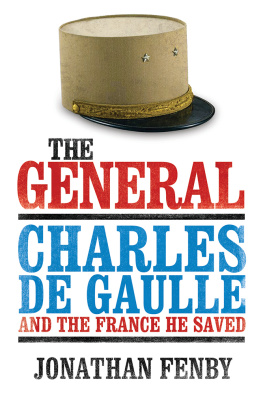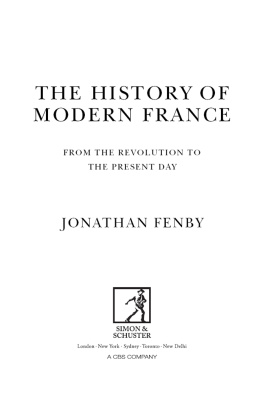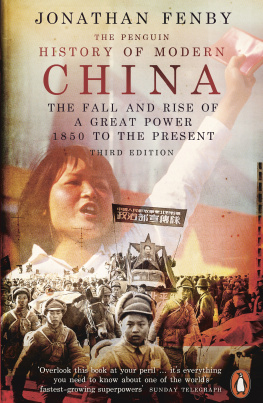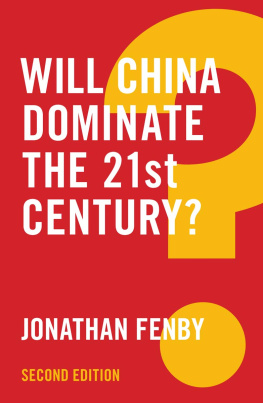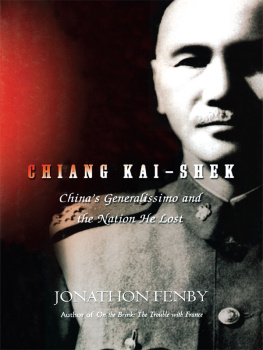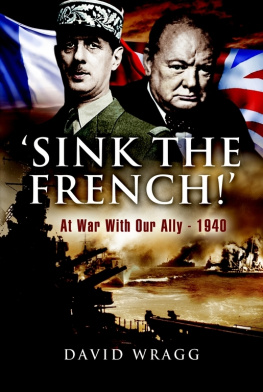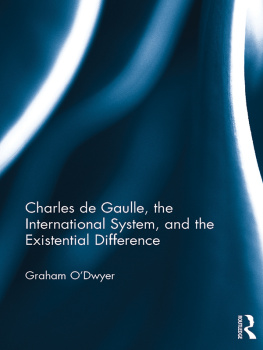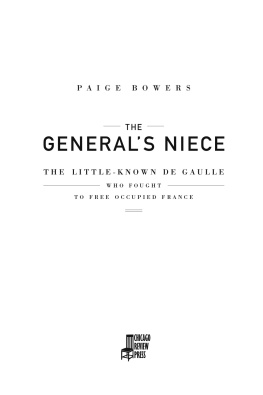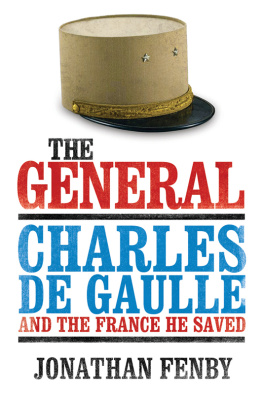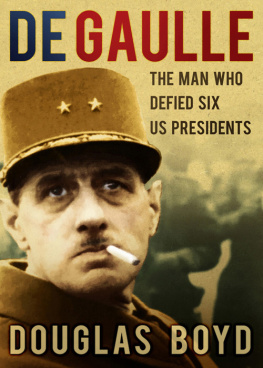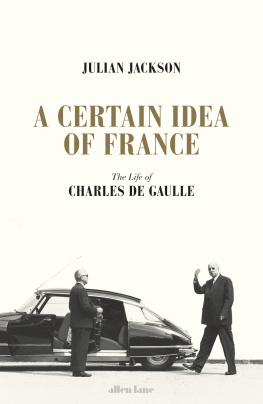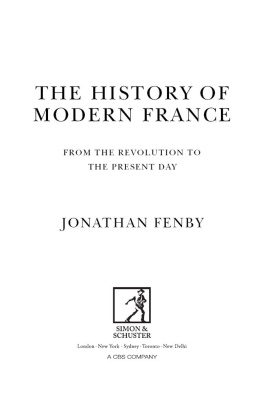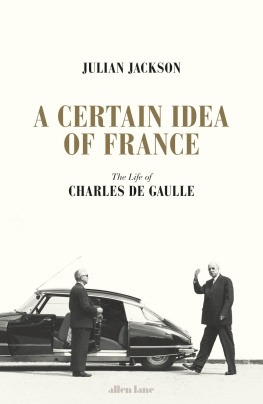THE GENERAL
Also by Jonathan Fenby
THE PENGUIN HISTORY OF MODERN CHINA:
THE FALL AND RISE OF A GREAT POWER
DRAGON THRONE: THE IMPERIAL
DYNASTIES OF CHINA
THE SEVENTY WONDERS OF CHINA (ED.)
ALLIANCE: THE INSIDE STORY OF HOW
ROOSEVELT, STALIN AND CHURCHILL
WON ONE WAR AND BEGAN ANOTHER
THE SINKING OF THE LANCASTRIA: BRITAINS WORST
NAVAL DISASTER AND CHURCHILLS COVER-UP
GENERALISSIMO: CHIANG KAI-SHEK AND THE
CHINA HE LOST
DEALING WITH THE DRAGON:
A YEAR IN THE NEW HONG KONG
ON THE BRINK: THE TROUBLE WITH FRANCE
THE GENERAL
CHARLES DE GAULLE AND THE
FRANCE HE SAVED
JONATHAN FENBY

Copyright 2012 by Jonathan Fenby
All Rights Reserved. No part of this book may be reproduced in any manner without the express written consent of the publisher, except in the case of brief excerpts in critical reviews or articles. All inquiries should be addressed to Skyhorse Publishing, 307 West 36th Street, 11th Floor, New York, NY 10018.
Skyhorse Publishing books may be purchased in bulk at special discounts for sales promotion, corporate gifts, fund-raising, or educational purposes. Special editions can also be created to specifications. For details, contact the Special Sales Department, Skyhorse Publishing, 307 West 36th Street, 11th Floor, New York, NY 10018 or info@skyhorsepublishing.com.
Skyhorse and Skyhorse Publishing are registered trademarks of Skyhorse Publishing, Inc., a Delaware corporation.
Visit our website at www.skyhorsepublishing.com.
10 9 8 7 6 5 4 3 2 1
Library of Congress Cataloging-in-Publication Data is available on file.
ISBN: 978-1-61608-600-8
Printed in the United States of America
To Lola and Kate, with love
CONTENTS
PART ONE
REACHING FOR THE HEIGHTS
PART TWO
THE MAKING OF A REBEL
PART THREE
ONE MANS COMBAT
PART FOUR
FROM VICTORY TO DEFEAT
PART FIVE
THE ROAD BACK
PART SIX
REPUBLICAN MONARCH
PART SEVEN
SHADOWS AND NIGHT
ACKNOWLEDGEMENTS
My initial debt is to Christopher Sinclair-Stevenson, my agent, who pressed me for several years to write a biography of de Gaulle; after five books on China it seemed high time to turn back to France and its most important figure of the last century. Mike Jones and Simon & Schuster showed a heart-warming interest in the idea, and I am grateful to my editor, Katherine Stanton, and her colleagues, together with copy editor Richard Collins and proofreader Sue Phillpott, for their care and speed in enabling the book to appear in time for the seventieth anniversary of de Gaulles historic 18 June appeal to resistance in 1940.
Many others assisted along the way, prominent among them Andr Villeneuve, who read the draft manuscript and provided research on the Second World War, Philippe Oulmont and his helpful colleagues at the Institut de Gaulle in Paris, Nathalie de Gaulle and Bernard Edinger who drew on his seemingly bottomless pool of knowledge to answer queries at the drop of an e-mail. I recalled conversations about de Gaulle with the late and invaluable Andr Passeron. Ginette Vincendeau was a guide to matters both cinematic and linguistic, as was Peter Graham. I am indebted, too, to Anne Boston, Coralie Poidatz and Richard Lambert for anecdotes and help. In Colombey, the Natali family provided memories as well as excellent food. Pierre Lethier pointed me to the interesting US archives on which I have drawn in chapters on the Fifth Republic. The sisters of the convent that now occupies de Gaulles wartime home in Hampstead were welcoming.
I am indebted to the staffs of the memorials in Colombey and Paris, the Bibliothque Nationale, the Archives Nationales and the Quai dOrsay in Paris and, in London, at the National Archives, the British Library and the invaluable London Library with its unexpected treasure trove of French books about the period. As always, while researching and writing, I benefited from the hospitality of relatives and friends, notably Annie Besnier, Jenny and Peter Thomas and the Count of Mourjou, as well as the sympathetic encouragement of that nonpareil belote partner, Simon Caulkin.
I owe a great debt, naturally, to the works of those who have written at length about the General in the past, notably Jean Lacoutures monumental biography, ric Roussels two-volume work and Alain Peyrefittes three-volume recounting of conversations with the President accounts of de Gaulle tend to be no shorter than their subject. The memoirs of many who worked with the General have been an invaluable source of material as have been the works of Admiral Philippe de Gaulle, Michel Tauriac and Jean-Raymond Tournoux. I am grateful to Editions Plon for allowing me to quote from their editions of the Generals notes, letters and speeches.
As always, writing took me away from family, and I am grateful to Sara and Alexander for putting up with this to which they would reply, no doubt, that they have grown used to it. My biggest debt is to my wife who played an even greater role in this book than in previous ones. Not only did she act as first reader, researcher, translator, compiler of the Glossary of Significant People, expert on the finer points of translating the often untranslatable General, and explainer of the Gallic viewpoint, but her participation made this enterprise a real partnership for which I cannot adequately express my thanks. All I can say is that the best way to write a book is with such a companion, even if we still argue over how to render some of the subjects words into English.
INTRODUCTION
When Charles de Gaulle boarded the small plane that took him from war-torn France to London on 17 June 1940, even he could not have foreseen the way in which he was launching himself on to the world stage. He was a little-known figure, a recently promoted two-star general acting in opposition to his countrys legal government in the midst of catastrophic defeat. But that flight marked the start of a trajectory which would see him save his country twice and found a republic that endures to this day, marking him out as a truly unique figure fulfilling an intense sense of manifest destiny.
He outlasted his great wartime contemporaries Roosevelt and Stalin were both dead and Churchill in retirement when he returned to power in 1958 at the age of sixty-eight to rule France for another ten years. None had quite the same self-awareness and sense of mission, epitomised in the way he spoke of himself in the third person. When de Gaulle the man looks at de Gaulle the historic figure, he understands that the historic de Gaulle has to act as is expected of him, he said. His fate was to be Frances republican monarch, answering to a calling far higher than everyday politics and acting on a plane of his own. When asked if he agreed to a proposal, he replied: I do not agree, I decide yes or no.
His life was more dangerous than that of most other leaders; he fought in two major wars and was the target of up to two dozen assassination attempts as President. But he declined to take precautions. In part at least, his fearlessness stemmed from his sense of the very special role he had to play. Explaining his refusal to take cover when German shells were falling around him in 1944, he told an official: I have a providential mission to fulfil. I think nothing will happen to me. If it does, I will have been mistaken.
A study of the ten words used most frequently in his speeches and broadcasts between 1958 and 1965 showed France or the country accounting for 55 per cent. The basic question, he wrote in a letter in 1963, was yes or no, should France be France? His vision was pitched so high that the French were bound to disappoint him all too frequently. For de Gaulle, life was a constant struggle, and he thought his compatriots all too prone to opt for an easy existence or compromise, leading him to brand them as

